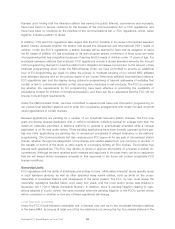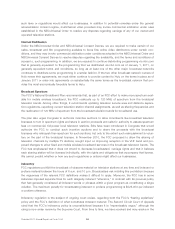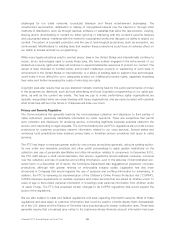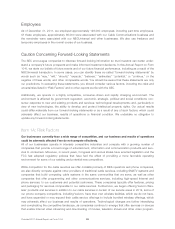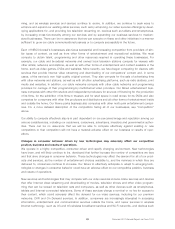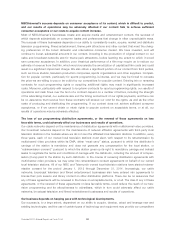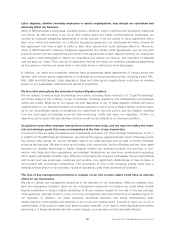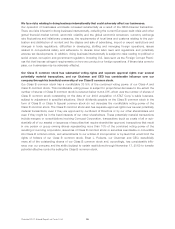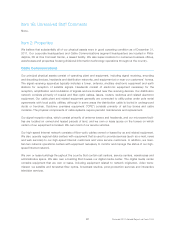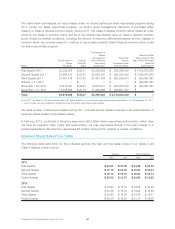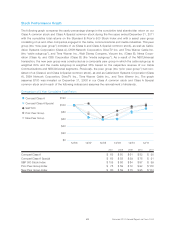Comcast 2011 Annual Report Download - page 34
Download and view the complete annual report
Please find page 34 of the 2011 Comcast annual report below. You can navigate through the pages in the report by either clicking on the pages listed below, or by using the keyword search tool below to find specific information within the annual report.NBCUniversal’s success depends on consumer acceptance of its content, which is difficult to predict,
and our results of operations may be adversely affected if our content fails to achieve sufficient
consumer acceptance or our costs to acquire content increase.
Most of NBCUniversal’s businesses create and acquire media and entertainment content, the success of
which depends substantially on consumer tastes and preferences that change in often unpredictable ways.
The success of these businesses depends on our ability to consistently create, acquire, market and distribute
television programming, filmed entertainment, theme park attractions and other content that meet the chang-
ing preferences of the broad domestic and international consumer market. We have invested, and will
continue to invest, substantial amounts in our content, including in the production of original content on our
cable and broadcast networks and for theme park attractions, before learning the extent to which it would
earn consumer acceptance. In addition, poor theatrical performance of a film may require us to reduce our
estimate of revenue from that film, which would accelerate the amortization of capitalized film costs and could
result in a significant impairment charge. We also obtain a significant portion of our content from third parties,
such as movie studios, television production companies, sports organizations and other suppliers. Competi-
tion for popular content, particularly for sports programming, is intense, and we may be forced to increase
the price we are willing to pay or be outbid by our competitors for popular content. Entering into or renewing
contracts for such programming rights or acquiring additional rights may result in significantly increased
costs. Moreover, particularly with respect to long-term contracts for sports programming rights, our results of
operations and cash flows over the term of a contract depend on a number of factors, including the strength
of the advertising market, our audience size and the timing and amount of our rights payments, and there can
be no assurance that revenue from these contracts will exceed our cost for the rights, as well as the other
costs of producing and distributing the programming. If our content does not achieve sufficient consumer
acceptance, or if we cannot obtain or retain rights to popular content on acceptable terms, or at all, our
results of operations may be adversely affected.
The loss of our programming distribution agreements, or the renewal of these agreements on less
favorable terms, could adversely affect our businesses and results of operations.
Our cable networks depend on the maintenance of distribution agreements with multichannel video providers.
Our broadcast networks depend on the maintenance of network affiliation agreements with third-party local
television stations in the markets where we do not own the affiliated local television stations. In addition, every
three years, each of our owned local television stations must elect, with respect to its retransmission by
multichannel video providers within its DMA, either “must-carry” status, pursuant to which the distributor’s
carriage of the station is mandatory and does not generate any compensation for the local station, or
“retransmission consent,” pursuant to which the station gives up its right to mandatory carriage and instead
seeks to negotiate the terms and conditions of carriage with the distributor, including the amount of compen-
sation (if any) paid to the station by such distributor. In the course of renewing distribution agreements with
multichannel video providers, we may enter into retransmission consent agreements on behalf of our owned
local television stations. All of our NBC and Telemundo owned local television stations have elected retrans-
mission consent for the period January 1, 2012 through December 31, 2014. Increasingly, our cable
networks, broadcast television and filmed entertainment businesses also have entered into agreements to
license their prior season and library content on other distribution platforms. There can be no assurance that
any of these agreements will be renewed in the future on acceptable terms, or at all. The loss of any of these
agreements, or the renewal of these agreements on less favorable terms, could reduce the reach of our tele-
vision programming and its attractiveness to advertisers, which in turn could adversely affect our cable
networks, broadcast television and filmed entertainment businesses and results of operations.
Our business depends on keeping pace with technological developments.
Our success is, to a large extent, dependent on our ability to acquire, develop, adopt and leverage new and
existing technologies, and the use of certain types of technology and equipment may provide our competitors
Comcast 2011 Annual Report on Form 10-K 32


